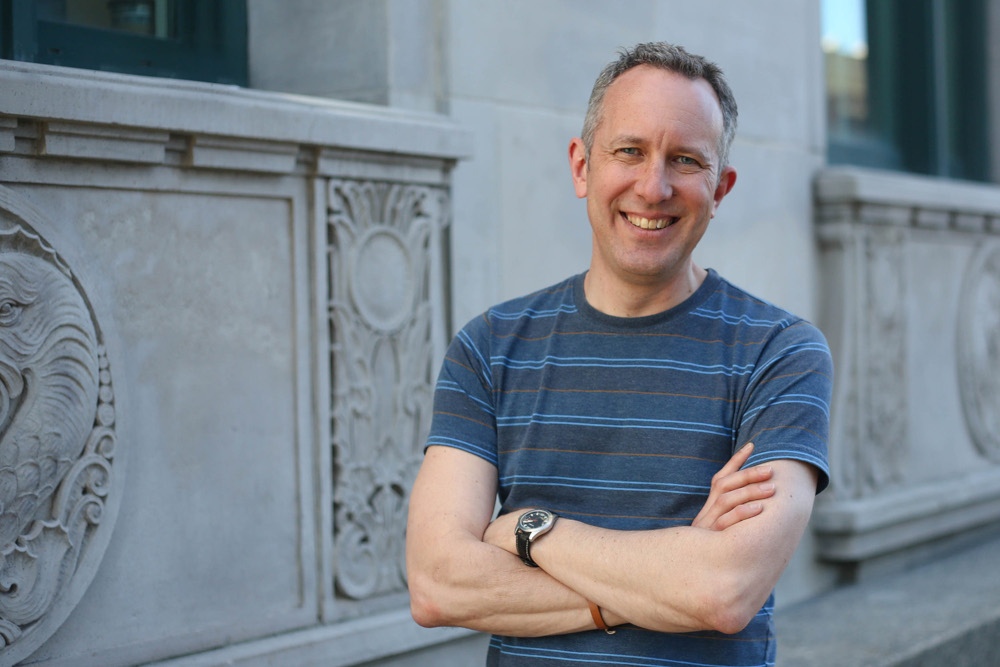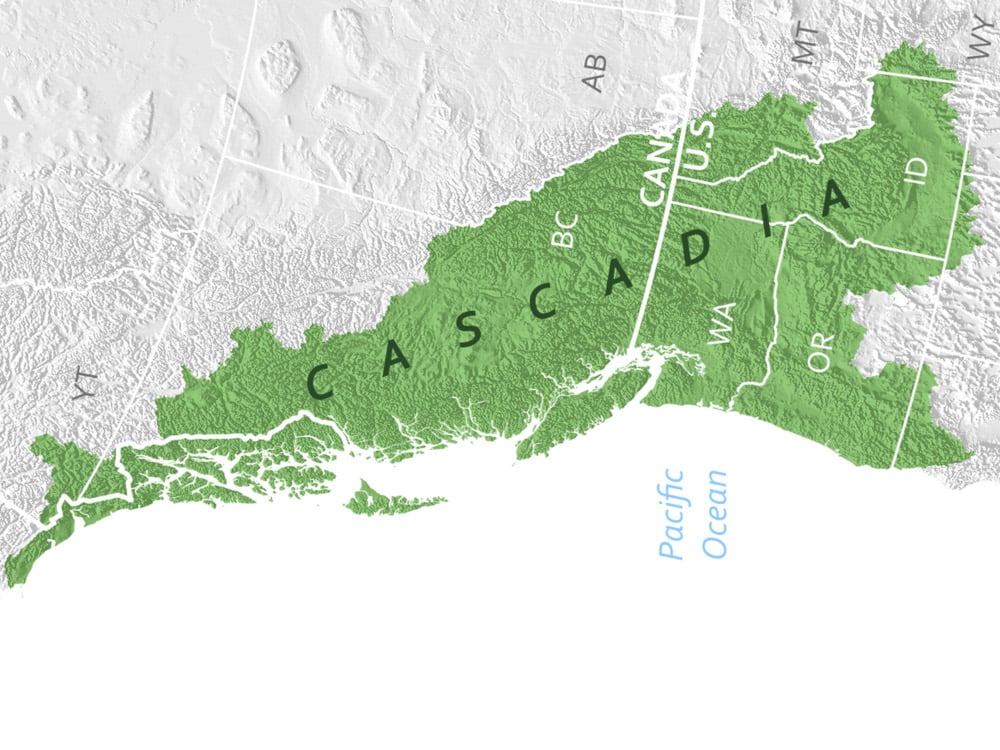Bioregions know no political borders. One map showed Seattle resident Andrew Engelson our human blindness to this fact.
Engelson hiked up Desolation Peak, part of the North Cascades in his home state of Washington, and visited the fire lookout at its summit. The U.S. Forest Service stationed Jack Kerouac there for 63 days in summer 1956.
The circular map that helped lookouts like Kerouac watch for smoke still remains in the wooden single-room cabin.
But when Engelson visited he noticed that the detailed map showed nothing on the other side of the 49th parallel, although the peak was just 10 kilometres from the Canadian border.
“It was blank — completely,” he said. “That for me encapsulated how we see the region.”
Engelson decided that journalism was the answer to helping people get to know their neighbours and happenings in the region, whether you call it Cascadia, the Pacific Northwest or the West Coast.
He launched Cascadia Magazine early last year. The magazine is a registered non-profit in Washington State that also collects reader donations. Engelson is working to register it as a federal non-profit, which would allow U.S. donors to make their contributions tax-deductible and help the publication qualify for more grants.
“Cascadia really does have a sense of identity you don’t find anywhere else in North America,” he said. “You don’t find much cross-border identity between, say, New England and Quebec. Here, there’s a sense of shared culture that I think is unique and worth investigating.”
Engelson also created Cascadia Daily, an email newsletter that briefs readers on what’s happening in the Pacific Northwest with curated offerings from other publications.
He highlights stories from the major daily and alt-weekly papers, but also from other online publications and literary periodicals. (We found out about the newsletter last year when The Tyee started showing up in it.)
Cascadia Magazine and the newsletter place fiction alongside news features and poetry alongside hiking guides. The mix reflects Engelson’s diverse resumé, which includes editing Washington Trails magazine, reporting on the arts for Seattle Weekly and freelancing for publications including the Seattle Post-Intelligencer and the Seattle Times.
We caught up with Engelson on a recent trip to Vancouver to get his thoughts on Cascadia as a place (it’s more than just microbreweries) and ask him why we should pay attention to what’s happening in the American side of Cascadia.

The Tyee: Cascadia obviously means many different things to many different people. Could you break them down for us?
Andrew Engelson: So you have the original idea of Cascadia, which sort of came from radical, environmentalist, left-wing hippie types who had read Ernest Callenbach’s book Ecotopia and thought the Pacific Northwest could be that Green utopia. That was the origin of the idea of Cascadia as a bioregion, as a place where you look at the ecosystem regardless of political borders.
Then you have people who think of Cascadia culturally, I’d say as the stereotypical Pacific Northwest, with microbreweries and coffee, wearing rain jackets instead of using umbrellas.
You’ve got the Cascadia Innovation Corridor, with its focus on tech and business leaders joining elected officials to meet and build a strong regional economy, build regional high-speed rail, that sort of thing.
Then you’ve got white supremacists who are using the racist, colonial history of the Pacific Northwest to justify the idea of creating a separate, whites-only nation. There’s a ton of ugly history in this region, and I don’t want to ignore that stuff.
One of the reasons I took on this project is to proclaim the fact that Cascadia is a diverse place of 16 million people from a variety of backgrounds and cultures.
Why should we in Canadian Cascadia pay attention to what’s going on in American Cascadia?
A lot of these issues in the bioregion don’t pay attention to borders.
When a fish farm in Washington’s San Juan Islands collapsed and a quarter-million salmon were released, those salmon didn’t stop at the border; they went up into the Fraser River, they went throughout the Salish Sea, threatening native salmon stock. So it’s super important for all of us on both sides of the border to pay attention. We can learn from each other on these issues, like fish farms, see how we’re approaching them in different ways.
South of the border, we like to think that everything’s better in Canada. But you look at your forest practices and mining, it’s pretty awful! You guys could learn a little from what we’re doing, too. On environmental issues, in Washington and Oregon, we’re actually pretty good at protecting wildlife. So I think there are opportunities to learn on both sides.
One of the first pieces we did was on the housing crisis, and how Portland, Seattle and Vancouver were approaching it with very different strategies. On homelessness, Seattle could really learn from how Vancouver is building modular housing. Seattle’s processes are so slow. Trying to pass an employee tax for homeless services and affordable housing was quickly rolled back after pressure from Amazon [for example].
That’s interesting, because people think of cities like Vancouver, Seattle and Portland as part of the “Left Coast.” What do you think of that?
Right now, British Columbia, Washington, Oregon, all their legislative and executive offices are controlled essentially by left-leaning politics. Cities like Vancouver and Seattle think of themselves as progressive. We tend to be an edge leader on a lot of social issues. We have legal pot. [Cascadia Magazine] is doing a story on polyamory, which is fairly popular in the Pacific Northwest.
At the same time, there is this strain of conservatism [in certain parts of Seattle]... The big wealth is problematic. I’ve seen Seattle change a lot over my lifetime, and a lot of people are nostalgic about Seattle being an affordable place.
We do have this creative culture, and we need to protect it. I think of it like protecting the wilderness, because we need to safeguard it or we’ll lose it. Or we’ll just be Geneva or San Francisco in three years, a place only rich people can afford to live in.
You must be familiar with a lot of publications since your Cascadia Daily newsletter samples content from across the bioregion. What’s the Cascadian media ecosystem like?
There’s so much great stuff going on in the region, lots of independent magazines like The Tyee, literary journals, alt-weeklies, but we’re all in our little silos. A lot of people might read Seattle Weekly, but they’ve never heard of The Tyee.
There’s an online news site called the South Seattle Emerald, just a small local news site dedicated to the south end of Seattle. The south end is fascinating; one of the neighbourhoods there is one of the most diverse zip codes in the United States. It’s got Latinos, Asian Americans, Indigenous people, African Americans, whites... It’s unlike any other in the U.S. So that online news source popped up to serve that community. It’s small, it’s targeted, and they’re doing a great job. It’s exciting that these small, nimble sites are popping up all over the region.
What’s tough is reaching the bigger audiences. The Seattle Times and the TV stations are still where a lot of people get news in the city.
What do you see as the magazine and the newsletter’s role in that ecosystem?
What I’m trying to do is offer quality long-form journalism that digs into a topic — something that somebody can read at lunch, read over the weekend — whether it’s an in-depth story about a First Nations protest against fish farms, maybe it’s a short story, maybe it’s a poem. Just something meaningful beyond the flow of junk you see on social media. There’s a really exciting scene of poets in Seattle right now and all over the region doing amazing work.
I’m really trying to look at it from 30,000 feet, give people a real sense of the culture here, whether it’s a profile of an Indigenous musician or a piece on an environmental issue. And give a mix of some fiction and poetry, the arts, culture in with the hard news. It’s definitely ambitious! But the content’s all out there online, every day.
Readers can visit Cascadia Magazine online here or subscribe to (and view older issues of) Cascadia Daily here.
Read more: Environment
















Tyee Commenting Guidelines
Comments that violate guidelines risk being deleted, and violations may result in a temporary or permanent user ban. Maintain the spirit of good conversation to stay in the discussion.
*Please note The Tyee is not a forum for spreading misinformation about COVID-19, denying its existence or minimizing its risk to public health.
Do:
Do not: